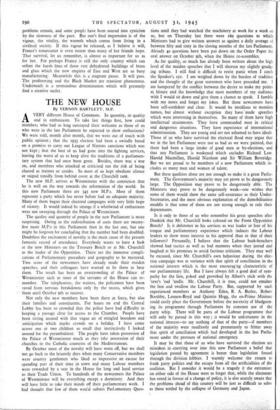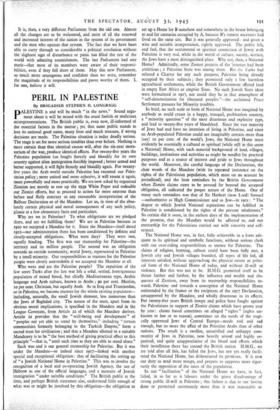THE NEW HOUSE
By VERNON BARTLETT, M.P.
AVERY different House of Commons. In quantity, in quality and in enthusiasm. To take last things first, how could members who had so long outstayed their welcome as those of us who were in the last Parliament be expected to show enthusiasm? We were told, month after month, that we were out of touch with public opinion ; that the 1935 election had been a swindle based on a promise to carry out League of Nations sanctions which was not kept ; that the best of us had gone into the fighting services, leaving the worst of us to keep alive the traditions of a parliamen- tary system that had once been great. Besides, there was a. war on, and members who attacked or criticised ran the risk of being classed as traitors or cranks. So most of us kept obedient silence
• or sniped timidly from behind cover at the Churchill tank.
The new M.P. arrives at Westminster with the conviction that he is well on the way towards the reformation of the world. In this new Parliament there are 345 new M.P.s. Most of them represent a party which has never before had an adequate majority. Many of them began their electoral campaigns with very little hope of victory. It would indeed be strange if a whirlwind of enthusiasm were not sweeping through the Palace of Westminster.
• The quality and quantity of people in the new Parliament is more surprising. Owing to the redistribution of seats there are twenty- five more M.P.s in this Parliament than in the last one, but one might be forgiven for concluding that the number had been doubled. Doubtless the excitement of novelty is the main cause of the present fantastic record of attendance. Everybody wants to have a look at the new Ministers on the Treasury Bench or at Mr. Churchill as the leader of the Opposition. There are the immense compli- cations of Parliamentary procedure and geography to be mastered. Two score of the newcomers have already made their maiden speeches, and their colleagues have wanted to be there to hear them. The result has been an overcrowding of the Palace of Westminster such as none of the servants of the House can re- member. The telephonists, the waiters, the policemen have been saved from nervous breakdowns only by the recess, which gives them until October 9th to recover.
Not only the new members have been there in force, but also their families and constituents. For hours on end the Central Lobby has been so crowded that the police have had difficulty in keeping a passage clear for access to the. Chamber. People have been sitting around with that vague air of mingled boredom and anticipation which marks crowds on a holiday. I have come across one or two children so small that instinctively I looked around for the perambulator. The people have taken possession of the Palace of Westminster much as they take possession of their churches in the Catholic countries of the Mediterranean.
By October most of the novelty will have worn off, but we shall not go back to the leisurely days when many Conservative members were country gentlemen who liked so impressive an excuse for spending part of their time in town and many Labour members were rewarded by a seat in the House for long- and loyal service to their Trade Union. To hundreds of the newcomers the Palace of Westminster will be everything except a dormitory. And they will have little to take their minds off their parliamentary work. I had thought that few of them would submit Parl.amentary Ques- tions until they had watched the machinery at work for a week or so, but on Thursday last there were 16o questions to which Ministers had to give written answers as against a daily average of between fifty and sixty in the closing months of the last Parliament. Already 4o questions have been put down on the Order Paper for oral answer on October 9th, when the House re-assembles.
As for quality, so much has already been written about the high level of the maiden speeches that I will shorten my slightly grudg- ing tribute. I still find it difficult to resist panic when I catch the Speaker's eye. I am weighed down by the burden of tradition and the thought of the great statesmen who have preceded me. I am hampered by the conflict between the desire to make my point, at leisure and the knowledge that most members of my audience wish I would sit down and give them a chance to speak. I fumble with my notes and forget my jokes. But these newcomers have been self-confident and clear. It would be invidious to mention names, but almost without exception they have-made speeches which were interesting in themselves. So many of them have high intellectual attainments. They have commanded men in critical and dangerous situations. They have experience of international administration. They are young and are not ashamed to have ideals. Those of us who have survived the electoral flood may argue that we in the last Parliament were not as bad as we were painted, that there had been a large intake of good men at by-elections, and that any Parliament is weakened which excludes Richard Law. Harold Macmillan, Harold Nicolson and Sir William Beveridge. But we are proud to be members of a new Parliament which in- cludes so many men and women of talent.
But these qualities alone are not enough to make it a great Parlia- ment. The Government's majority may yet prove to be dangerously large. The OppoSition may prove to be dangerously able. The Ministers may prove to be dangerously weak—one wishes that some of them would show the same self-assurance as their Under- Secretaries, and the most obvious explanation of the demobilisation muddle is that some of them are not strong enough to rule their departments.
Is it only to those of us who remember his great speeches after Dunkirk that Mr. Churchill looks colossal on the Front Opposition Bench? Is it deference to his services as war leader or fear of his tongue and parliamentary experience which induces the Labour leaders to show more interest in his approval than in that of their followers? Personally, I believe that the Labour back-benchers showed bad tactics as well as bad manners when they jeered and laughed at his promises to avoid factious criticism. They may well be excused, since Mr. Churchill's own behaviour during the elec- tion campaign was at variance with that spirit of conciliation in the national interest which is the most encourag'ng characteristic of our parliamentary life. But I have always felt a good deal of sym- pathy for the lion, poked and provoked by Albert's stick with the 'orse's 'ead 'andle. Mr. Churchill, it is true, could not emulate the lion and swallow the Labour Party. But, supported by such experienced members as Anthony Eden, R. A. Butler, Robert Boothby, Lennox-Boyd and Quintin Hogg, the ex-Prime Minister could easily place the Government before the necessity of bludgeon- ing its programme through Parliament by constant use of the party whip. There will be parts of the Labour programme that will only be passed in this way ; it would be unfortunate in the national interest—to say nothing of that of the party—if members of the majority were needlessly and prematurely to fritter away that spirit of conciliation which had developed in the last Parlia- ment under the pressure of national emergency.
It may be that those of us who have survived the election are mistaken in -carrying over into this new Parliament a belief that legislation passed by agreement is better than legislation forced through the division lobbies. I warmly welcome the return to frank party politics and the escape from all the artificialities of the coalition. But I consider it would be a tragedy it the extremists on either side of the House were to forget that, while the electorate has voted in favour of a change of policy, it is also acutely aware that the problems ahead of this country will be just as difficult to solve as those settled by the collapse of Germany and Japan. It is, then, a very different Parliament from the old one. Almost all the changes are to be welcomed, and most of all the renewed and increased interest of the nation in the system of its government and the men who operate that system. The fact that we have been able to carry through so considerable a political revolution without the slightest sign of disturbance or panic has filled the rest of the world with admiring astonishment. The last Parliament had one merit—that most of its members were aware of their responsi- bilities, even if they fell short of them. May this new Parliament, so much more courageous and confident than we were, remember the magnitude of its responsibilities and prove worthy of them. I, for one, believe it will.



























 Previous page
Previous page